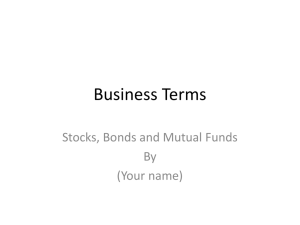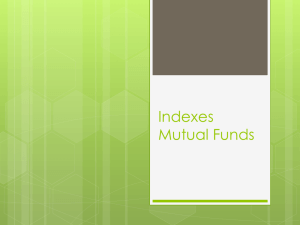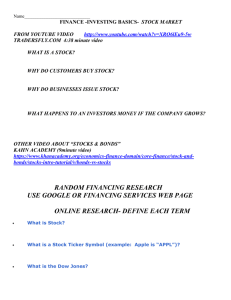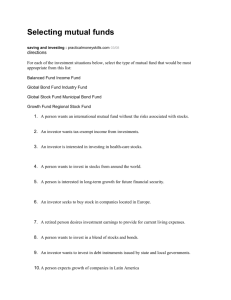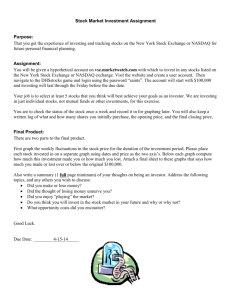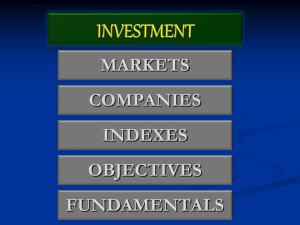stock market powerpoint notes
advertisement
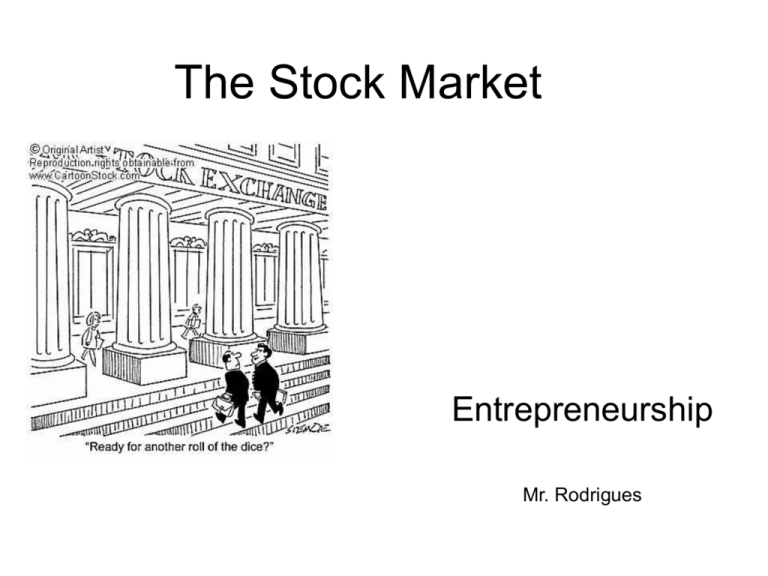
The Stock Market Entrepreneurship Mr. Rodrigues Corporations • Defined: A Business that is registered by a state and operates apart from its owners. • A corporation exists separate from its owners • Treated as an Artificial Person or Thing – It pays taxes, hires people, enters into contracts, accrues debt – Corporations can have an unlimited lifespan – Individuals who start a corporation are called promoters – Promoters must file Articles of Incorporation with the state • Name of Corporation • Promoters’ Names /Addresses • Why and how long it will be in business – Ownership of a corporation is allotted through the possession of stock. Very Basic Overview of Stock • Stock is considered pieces of a corporation • Stock is split into shares • People who buy and own stock are called shareholders or stockholders – They are all partial owners of the company according to the amount of stock they hold • Price follows basic economics – The greater the number of Shares, the lower the price – The lower the number of Shares, the higher the price • The amount of control you have in the company increases with the amount of stock you own • Companies issue stock to help fund the corporation Stock Indexes • Between the NYSE, NASDAQ and AMEX, there are thousands of companies that have stock for sale. • Some of these companies are more important than others. • What we have set up is the Dow Jones Industrial Average (DJIA) or Dow • The Dow is made up of ‘key’ stocks that are characteristic of the entire US Economy. • These stocks are usually the most widely owned stocks from the most successful, reputable companies Stocks on the Dow • • • • 3M – Sticky Notes, tape Alcoa – Aluminum AT&T – Phones / Internet Boeing – Airplanes, Defense, Satellites • Coca-Cola – beverages • Exxon Mobile – Oil/Gas • General Electric – Diversified Industries • General Motors – automobiles • • • • • Hewlett Packard- computers IBM – computer services McDonalds -- food Microsoft -- software Procter & Gamble – consumer goods • Verizon -- telecommunications • Wal-Mart – general retail • Walt Disney – entertainment NYSE • The NYSE is located in New York, NY on Wall and Broad Streets. • It is considered the financial capital of the US and the world • Here, stocks are exchanged in a traditional manner—a mix of human interaction and computerized transactions NASDAQ • The NASDAQ is a decentralized stock exchange that operates completely electronically. • Various computers link buyers and sellers together without any human interaction occurring. • Generally the NASDAQ is comprised on smaller, more technologically advanced companies S&P 500 • The S&P 500 is a group of the largest (most capital) US companies • Tracking the S&P 500 can provide more insight into how the overall Economy is performing • This group or index is much broader than the DOW and provides a more comprehensive look at the economy— however it lacks the diversity of the DOW The Securities and Exchange Commission • What is to stop companies you invest in from cheating you? • The SEC is a government agency whose purpose is to regulate the securities industry (the stock markets). It was created after the Great Depression when Congress passed the Securities Exchange Act of 1934. THE SEC • All companies traded on the many stock exchanges across America have to be registered with the SEC. Each must follow rules about what they can do with their stock, how they can advertise, and much more. • SEC rules and regulations not only pertain to companies on the Exchange, but to the brokers that trade, and to you, the investor. Insider Trading • Insider information is information that a person obtains about a company that is not available to the rest of the public, that can be used to their advantage while buying stocks. • For example, lets say you are the CEO of company XYZ, and company ABC is now in negotiations with you to merge, and create a much larger company called GHI Inc. • Now, usually mergers cause stock prices to go up, so if you, knowing that a merger is going to take place, go out and buy a lot of stock from both company ABC, and XYZ, you are using insider information, and are breaking the law. • INSIDER TRADING IS LIKE SELLNG CRACK, IT’S ILLEGAL but many get away with doing it because it is hard to track Annual Reports • The Securities and Exchanges Act of 1934 also mandated that companies file an Annual Report. • An Annual Report is a book printed annually that contains all of the financial information concerning a company. • The annual report was designed to make companies more transparent and allow investors real insight into the companies financial health Buying on Margin • When buying on margin, you partially purchase stocks with money that is not yours—it belongs to the bank. • The bank loans you the money and charges you interest—however you may be able to cover the interest charge with a success investment • Since the 1930s, investors must have at least 50% of the stocks value invested with cash Mutual Funds • • • In modern times, less people buy individual stocks. They generally invest in Mutual Funds. A mutual fund is a professionally managed investment that is made up of a combination of stocks. There are many different types of Mutual Funds available • Well it was pretty easy to buy a few shares of McDonalds, but what if you are not sure about which stock you should buy? Maybe you would rather let a professional choose the stocks for you. Well, you are not alone. Millions of people turn over control of their finances to professionals by buying Mutual Funds. There are two types of mutual funds, open and closed. Open mutual funds, such as Fidelity Magellan, let people put their money in them, just like a bank. The difference is that banks take your money and lend it out, and then pay you interest on the money you gave it. This is static, in that it does not change. When you put your money in, the bank usually says we will give you 3 percent interest. When you put your money in a mutual fund, they take that money, along with that of millions of other people who are investing, and buy stocks and bonds with it. They then take out part of the profits for themselves, a commission, and give you your share. Closed end mutual funds, are similar to their open counterparts in that you turn over control of your money to professionals but, rather than putting money in them like a bank, you buy shares like a stock. This means that a closed end mutual fund acts just like any other stock on the Stock Exchange, they have Ticker Symbols, and are traded. The difference is that these mutual funds, instead of making burgers, or creating airplanes, take the money they have, invest it, and return the profits to the share holders. • •
